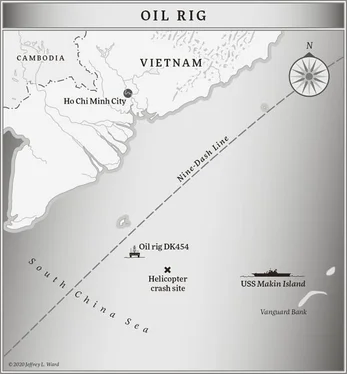The senior officer gave a curt nod.
“Do it.”
“Get us out of here!” Chavez barked as soon as he saw what was going on. A half-dozen workers had already taken the fifteen-meter plunge off the rig deck. Others worked their way down three sets of ladders to inflatable lifeboats bobbing in the chop below.
Still two hundred feet above the rig, the chopper pilot increased power and broke quickly to the right.
Adara leaned to get a better look out the window. “There’s a fi—”
A blast wave slammed into the Mi-17’s fuselage, lifting it suddenly skyward as if with a giant hand.
The explosive roar that accompanied the wave covered the pilot’s impotent curse as he lost all control of the helicopter.
Ding’s gut rose in his chest as the helicopter began to fall.
The pilot, still struggling to regain control, spoke over the intercom, his voice surreally calm now, considering that the aircraft was spinning wildly as it plummeted toward the sea.
“Not looking good, boys and girls!” He paused, seemed to regain partial control, and then another piece of the tail boom broke away. “Brace, brace, brace!”
9
Eleven miles away, the communication officer on the bridge of the USS Makin Island passed the word to the officer of the watch that he was receiving an emergency distress call from an offshore Vietnamese oil rig, noting that he’d heard the distinctly American voice of the pilot of an approaching chopper preparing to land almost simultaneously with the emergency call from the rig. The watch officer noted an inky black ball of smoke above the horizon to the west.
Makin Island ’s skipper, Captain Roosevelt “Rosey” Jackson, had been on the weather deck, watching the Marines practice their marksmanship off the fantail, when the call came in. The officer of the watch called him and the XO in immediately. He’d already notified the Prebble , their escort destroyer, to prepare to adjust course to steam in the direction of the explosion. They were guests of the Vietnamese, with standing orders to assist in deterring Chinese aggression with their presence. And Chinese aggression wasn’t exactly in short supply in these waters. Every sailor’s first thought when a distress call came in was that a PLA-Navy or Chinese Coast Guard ship had bullied a smaller vessel again, or even rammed it, putting lives in danger.
“Good job,” Jackson said to the young lieutenant standing watch in his absence, noting their course and speed as soon as he entered the bridge. Captain Jackson was known far and wide as a deckplate officer, a servant leader who mentored and encouraged even his most junior subordinates to show initiative. Toward apparent danger was the right direction to be moving. “What have we got?” he asked, addressing the sailor at the radio.
“Distress call came in four minutes ago, Captain,” the twentysomething radar operator said, his eyes locked to the screen. “I’m picking up broken static that I believe to be someone transmitting from a handheld VHF. Could be people in the water.”
“Very well,” Jackson said. “Let’s get both the Seahawks and the 53 in the air. They can drop rescue swimmers and life rafts, start rescuing any survivors while we’re en route.” He turned to the radar tech. “Anyone else coming to the party?”
“Negative, Captain. I have two PLAN frigates eight miles to the north. Chinese Coast Guard Cutter 3901 is fifteen miles to our east. None of them appear to be making a move toward the location of the distress call at this point.”
“They’re timing our response, no doubt,” Jackson said. “Seeing how long it takes us to clean up whatever mess they’ve made. All ahead full.” He turned to Laura Kelso, his executive officer, who repeated the order to the helm. On the Makin Island , the petty officer first class actually driving the ship was able to increase the ship’s speed using throttle control from the bridge, rather than the traditional telegraph system, to make engineering aware of the captain’s orders.
Jackson caught Kelso’s eye. “XO, have the birds report back to us as soon as they have visual.”
“Aye, aye, sir,” Commander Kelso said, and went to work.
A Wasp -class Landing Helicopter Dock, or LHD, the USS Makin Island was easy to confuse with an aircraft carrier. At 843 feet long, she was not a small ship, but still a football field shorter than a Nimitz -class big deck. Designated LHD 8, she carried a variety of armament and aircraft, the type and number varying depending on their specific mission. Today, in addition to the CH-53 Sea Stallion and the two MH-60 Seahawk helicopters Captain Jackson had already sent ahead, LHD-8 had a complement of two SuperCobras, eight V-22 Osprey tilt rotors, and four Harrier Jump Jets. But even the Sparrow Missiles and MK-38 chain guns paled in capability compared to the eight-hundred-strong U.S. Marine Expeditionary Unit on board.
Sometimes called a Marine Uber, Makin Island ’s purpose was to move this impressive fighting force to project American might. Line officers sometimes tended to look down their noses at officers in the Gator Navy—the men and women who, for all practical purposes, drove the Marines around. Captain Jackson loved his Marines, and he had no doubt they would do anything for him, even if that meant risking their lives to jump into the water and save a bunch of Vietnamese oil workers if he ordered them to.
“ETA twenty-two minutes,” Commander Kelso said. Like Jackson, she was an Annapolis grad. She expected nothing extra for it, and kept her ring-knocking to a minimum, intuiting early on that with this skipper past accomplishments mattered far less than present duty. Everyone on the ship knew that Jackson’s uncle had been President of the United States until he was assassinated. But Rosey Jackson never mentioned that part of his past. His father had taught him well. There was tremendous gravitas in the things a man left unsaid.
Of all the training the U.S. government had afforded Ding Chavez, the thing he’d hated most was the dunker. At a nod from the sadistic instructor, the mock–helicopter cockpit slid down a rail, slammed into the surface pool like it was concrete, and then inverted as it sank to the bottom. Chavez had never been afraid of flying, or the water, but he’d dismissed the dunker as serious overkill. He was a ground pounder, an infantryman. If he went down in a chopper he would either walk away or his shit was toast. He saw no need in getting jerked around on a million-dollar government carnival ride with water up his nose and a couple of Navy divers waiting in the deep end, laughing into their regulators while they watched him try to figure out which way was up. Clark had mandated the training for every member of Rainbow, and Chavez had pretended to be on board. The man was his father-in-law, but he’d hated every sputtering minute of it.
Now, hanging by a nylon harness from the inverted floor of a rapidly sinking Russian helicopter, with his ass above his head, ears buzzing, and darkness fast closing in, Chavez found himself reliving every detail of his previous training. John Clark’s adage of doing something not until one got it right, but until one didn’t ever get it wrong, played out in spades. Without conscious thought, Chavez found the harness release and gave it a twist. Underwater, he didn’t fall to the ceiling as he would have on dry land, but floated, trapped inside the body of the sinking chopper.
Chavez’s first thoughts were for his teammates, and he found himself flooded with relief when a sweep to his left found an empty harness where Midas would have been. Chavez kicked forward, feeling in the darkness for the last place he’d seen Dom and Adara, his shoulder bumping into Midas as the former Delta officer performed the same search. Quickly running out of air, Chavez gave Midas a squeeze on the shoulder and pointed toward the cockpit. The pilot met them head-on, swimming his way aft to check on his passengers. With Adara and Dom apparently out, Chavez motioned toward the open door and followed the other two men out. He kicked toward the surface, feeling the searing pain of some unidentified injury in his neck. His lungs screamed for air. His ears chirped and whistled as the pressure against them dropped. Above him he could see light, legs dangling below the surface.
Читать дальше











![Александр Ирвин - Tom Clancy’s The Division 2. Фальшивый рассвет [litres]](/books/417744/aleksandr-irvin-tom-clancy-s-the-division-2-falsh-thumb.webp)
